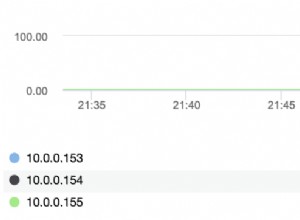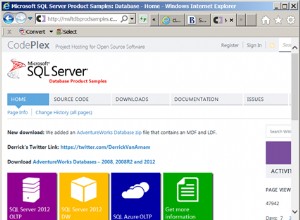Principio KISS :basta usare phpMyAdmin? Quasi sicuramente è installato. In caso contrario, installarlo .
La sua capacità di importazione è magnifica. Se il tuo database è per caso troppo grande, gzip. Se è ancora troppo grande, prova a dividerlo in pochi pezzi. Dubito che tu debba trasferirlo come un'unica grande transazione. Tu?
Dopo la spiegazione nel primo commento, beh, ecco qui. Questo è il mio script molto semplicistico che fa quello che vuoi. Solo che non dà un'occhiata ai separatori:una query ==una riga.
<link href="style/contents.css"/>
<?
function timesanitize($v) {
if ($v > 0)
return round($v, 4);
else
return 0;
}
$startmt = microtime();
include_once 'include/db.php';
$f = fopen("db.sql","r");
echo dbGetEngine() . "<br>";
echo "<ul>";
do {
$l = rtrim(fgets($f));
if (strlen($l) == 0)
continue;
if (substr($l, 0, 1) == '#')
continue;
$l = str_replace(
array("\\n"),
array("\n"),
$l);
if (dbGetEngine() == "pgsql")
$l = str_replace(
array("IF NOT EXISTS", "LONGBLOB"),
array("", "TEXT"),
$l);
try {
echo "<li>".nl2br(htmlspecialchars($l));
$mt = microtime();
$db->query($l);
echo "<ul><li>ok - " . timesanitize(microtime() - $mt) . "</ul>";
} catch (PDOException $e) {
echo "<ul><li>".$e->getMessage() . "</ul>";
}
} while (!feof($f));
fclose($f);
echo 'total: ' . timesanitize(microtime() - $startmt);
?>
Emette anche una piccola statistica del tempo impiegato da ciascuna query. Si basa su DOP; Credo che PDO sia stato introdotto in PHP5.1 o PHP5.2. Penso che dovrebbe essere banale modificarlo per funzionare direttamente con mysql_*() funzioni, se per qualche motivo lo preferisci.
E ancora:sì, lo so che fa schifo. Ma finché funziona per me (tm), e possibilmente per te... :-)
Per completare il codice, ecco include/db.php e un esempio include/config.php :
include/db.php :
<?
include_once 'include/config.php';
try {
$attribs =
array(
PDO::ATTR_PERSISTENT => $config['db']['persistent'],
PDO::ATTR_ERRMODE => $config['db']['errormode']
);
$db = new PDO(
$config['db']['uri'],
$config['db']['user'],
$config['db']['pass'],
$attribs
);
$db->query("SET NAMES 'utf8'");
$db->query("SET CHARACTER SET 'utf8'");
} catch (PDOException $e) {
print "Error!: " . $e->getMessage() . "<br/>";
die();
}
function dbGetEngine() {
global $config;
return substr($config['db']['uri'], 0, strpos($config['db']['uri'], ':'));
}
?>
include/config.php :
<?
//$config['db']['uri'] = 'sqlite:' . realpath('.') . '/site.db'; // PDO's database access URI
$config['db']['uri'] = 'mysql:host=localhost;dbname=sitedb'; // server should be : 195.78.32.7
//$config['db']['uri'] = 'pgsql:host=localhost;dbname=sitedb';
$config['db']['user'] = 'user_goes_here'; // database username
$config['db']['pass'] = 'pass_goes_here'; // database password
$config['db']['persistent'] = false; // should the connection be persistent
$config['db']['errormode'] = PDO::ERRMODE_EXCEPTION; // PDO's error mode
?>
Sono incluse stringhe di connessione di esempio per SQLite, MySQL e PostgreSQL.




